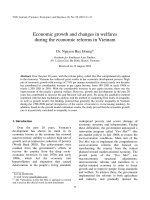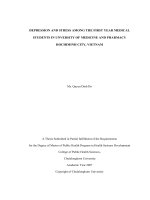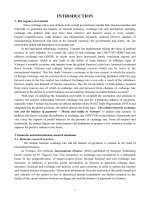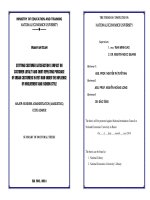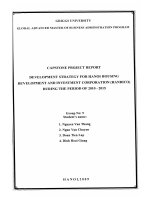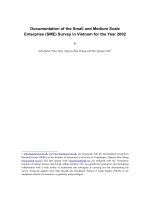Outstanding achievements of medicine and pharmacy in Vietnam during the period of 2011-2015
Bạn đang xem bản rút gọn của tài liệu. Xem và tải ngay bản đầy đủ của tài liệu tại đây (511.98 KB, 4 trang )
life sciences | Medicine and Pharmacology
Outstanding achievements of medicine and pharmacy
in Vietnam during the period of 2011-2015
Gia Khanh Pham*
Chairman of the National Program of Applying Advanced Medical and Pharmaceutical Technology in Vietnam
Received 16 December 2016; accepted 24 February 2017
Abstract:
Based on the success of research that applies advanced international medical
and pharmaceutical technology to projects of Vietnam’s Ministry of Science
and Technology, the author presents some outstanding achievements in science
and technology in medicine and pharmacy during 2011-2015. These results
contribute significantly to the healthcare of the community; raises Vietnam’s
medical science to keep up with developed countries, provides a great socioeconomic significance, and also indicates the important position of science
and technology as well as the benefits of scientific investment into medical and
pharmaceutical fields.
Keywords: advanced medical and pharmaceutical technology, science and
technology, Vietnam.
Classification numbers: 3.2, 3.3
I
n the past five years, thanks
to science and technology
programs from the Ministry
of Science and Technology,
the level of Vietnam’s science and
technology advancement in the
medical and pharmaceutical sectors has
significantly progressed. It might be said
so far, that most of the new technologies,
innovative applications for diagnosis,
treatments, and preventions of diseases
that other countries are using, have
already been deployed in Vietnam,
including many techniques that have
achieved a comparable level with those in
developed countries. This paper presents
some of the outstanding achievements of
medical and pharmaceutical science and
technology reached in the last five years.
Biological technology
Across
the
world,
modern
biotechnology was accepted into
medical and pharmaceutical fields very
early on and has achieved incredible
success. In the middle of the 1970s,
during the last century, due to the
*
success of monoclonal antibodies,
scientists revolutionized biotechnology
by forming medicines, and now, the
revolution has fully exploded. Many
achievements in medicine have been
reached. Many nascent techniques
have been used to help diagnose
life threatening diseases early and
accurately, and several new treatments
have been created to cure those diseases.
Biotechnology has established some
new specialties including molecular
medicine, molecular pathology, and
methods that have unraveled the many
mysteries of the microscopic world of
disease. Vietnam’s biotechnology’s lag
by about 30 years behind the rest of the
world, but until recently, that lag time
has shortened. We can say the essential
biotechnologies used for diagnosis,
treatment and prevention of diseases
used in the rest of the world has been
implemented in the country.
Successful application of genetic
engineering techniques for the
diagnosis, treatment and prevention of
diseases, for example:
Email:
54
Vietnam Journal of Science,
Technology and Engineering
March 2017 • Vol.59 Number 1
+ Applied multi-primer PCR to
identify EML4-ALK & EGFR genes
targeting therapy for non-small cell
lung cancer (Crizotinib) [1]. Applied
FISH techniques to determine HER2 in
breast cancer to help specify the exact
target in selecting drugs [2]. This was a
new horizon in cancer treatment, and is
highly effective.
+ Applied ASB realtime PCR
technique for the detection of T1799A
BRAF gene mutations to diagnose
papillary thyroid cancer [3].
+ Created multi-primer PCR protocol
(Multiplex PCR) for the detection of
common sepsis pathogens [4].
+ Used a gene sequencing technique
to identify a number of genes involved in
the antibiotic resistance of 13 common
strains of pathogenic bacteria found in
Vietnam [5].
+ Used chromatography and FISH
to establish a protocol to engineer
three neonatal disease screenings:
Hypothyroidism congenital adrenal
hyperplasia and lack of GDP-6 [6].
+ Protocolled diagnosis and
screening of common Vietnamese
genetic diseases before embryo transfer
(Pre-implantation Genetic Diagnosis) in
vitro fertilization [7].
Application
treatment
of
stem
cells
in
We have mastered the technique
of isolating stem cells from different
sources to treat some blood disorders,
cardiovascular diseases, osteoarthritis,
respiratory issues, and cancers; and
those preliminary and initial results are
similar to countries in other parts of the
life sciences | Medicine and Pharmacology
world [8].
Techniques of Ionizing radiation
Ionizing radiation is used mainly
for three specialties: nuclear medicine,
X-ray and oncology. In recent years,
a number of modern techniques of
ionizing radiation have been launched.
These techniques have helped early
diagnosis, accurate and early detection
of metastases, cancer recurrence, and
accurate diagnosis of stage of diseases.
Therefore, the treatments are correct,
appropriate, effective and safe. These
techniques have changed over 30%
of initial treatment plans into proper
therapies, causing a breakthrough
in cancer treatment. Here are some
outstanding results:
- The application of Intense
Modulated Radiation Therapy (IMRT)
using PET/CT image scanning to
simulate radiation therapy planning to
the treatment of throat cancer, lower
throat larynx cancer, and esophagus and
lung cancer [9]. IMRT is a technique
that uses adjusting doses of radiation
beams based on tumor morphology, and
changes the intensity of the radiation
beams according to the density of the
cancer cells, thereby optimizing the high
doses at the tumor while minimizing the
doses on surrounding healthy organs.
Therefore, treatment efficiency is higher
and safer. This is the top technique for
radiation currently used around the
world; only a few developed countries
implement this technique, such as the
United States, Germany, Italy, Australia.
- The application of radiosurgery
techniques using the rotating gamma
knife technique for the treatment of
brain tumors and some other brain
diseases [10]. The rotating gamma knife
procedure has the accuracy of classical
gamma knife system, but uses Co-60
radiation sources and cubism radiation
techniques based on the accelerator,
forming a cubism radio-surgery
approach based on the principle of using
the powerful radiation sources of Co-60,
and is focused and correctly localized to
the tumor or pathological brain region.
The radiation beam is rotated and focused
at different trajectories, so tumors and
lesions receive the highest doses of
radiation, but surrounding healthy tissue
received very low radiation doses. So
the radiosurgery system with gamma
knife is an ideal piece of equipment used
in the current rotating set of radiosurgery
techniques.
The application of stereotactic body
radiotherapy using cyber knife has
enhanced the effectiveness of treatments
and is comparable to surgery.
- The implantation of radioactive
I-125 seeds (Permanent radioactive
seed implant) in the treatment of
prostate cancer has begun: This is a new
technique, that is modern, and overcomes
the disadvantages of previous radiation
therapies. This new technique has been
implemented in a few countries around
the world, and was first implemented in
Vietnam at Bach Mai Hospital in April,
2015.
- The application of 18F-FDG PET/
CT used for diagnosing and monitoring
treatment outcomes of cardiovascular
disease and cancer, so that the right
treatment is indicated brings high
treatment outcomes [11].
Pharmaceutical sector
Applications of high-tech
manufacturing and apothecary
in
- The successful apothecary of
injecting liposomes with two cancer
drugs, including doxorubicine and
amphotericin B [12]. Liposome,
progressed technology in pharmaceutical
applications, is a new technology used
worldwide which was originally applied
in Vietnam. This technology increases
a drug’s efficacy and reduces toxicity,
through the mechanism of targeted
therapy.
- The successful apothecary of longacting pills used to treat cardiovascular
diseases and diabetes, which is designed
for extended-release for the purpose of
reducing the number of medications
that patients must take, and improve
the treatment efficacy and reduce side
effects of drugs [13].
- The successful apothecary of
injecting lyophilized carboplatin for the
treatments of cancer on an industrial
scale [14]. This form of medicine easily
helps the preservation and use of drugs.
Production of vaccines
We have mastered the technology for
producing the vaccine Rotavin-M1, used
to prevent diarrhea in children caused by
Vero cells [15]. The drug has since been
confirmed for safety and efficacy by the
CDC. This result has named Vietnam as
the fourth country in the world to produce
the Rota vaccine, after the United States,
Belgium and China. Thanks to domestic
drug production with low costs, the
vaccines have been put into expanding
immunization programs.
Production of medical biological
agents of high value used for diagnosis
- The primers PCR kit has three target
genes that act for rapid diagnosis of
TB and drug-resistant TB [16]. Thanks
to the three target genes, this kit has a
higher sensitivity and specificity than
imported kits.
- The rapid, accurate diagnosis
kit for simultaneous multiple organ
fungi has helped clinicians accurately
diagnose patients with fungal organs that
previously often would be overlooked
[17].
Application of biomass technology
for producing Ngoc Linh ginseng root
cells [18]
Ngoc Linh panax is a rare medicinal
herb that has been exhaustively exploited.
Advantages in cell biomass has shown
a very short incubation period of only
about 10-20 days, reduced affect by
weather, epidemics, select potential cell
with high biologically active substances
and stable material quality so consistent
with drug production according to GMP
standards. Although natural Ngoc Linh
panax does not fully meet the demand,
thanks to this technology the market still
has many products from biomass Panax
that are preferred by clinicians.
Organ transplantation [19-21]
Transplantation in Vietnam was
applied 50 years later than across the
rest of the world, and 20 years later than
other countries in the region. The first
March 2017 • Vol.59 Number 1
Vietnam Journal of Science,
Technology and Engineering
55
life sciences | Medicine and Pharmacology
successful kidney transplant in Vietnam
was performed in 1992; then, after 18
years of effort, in 2010, transplantation
in
Vietnam
achieved
advanced
techniques of organ transplants equal to
the rest of the world. That means that
we have gained control of the common
techniques of organ transplant, including
kidney, liver and heart transplant from
living donors and brain dead donors.
However, by 2010, we still had some
outdated technologies that the rest of
the world hadn’t used for nearly 20-50
years. Technologies to perform lung
and pancreas transplants, and techniques
for donations after cardiac death
(DCD) and multi-organ transplants. To
solve this problem, KC10 2011-2015
program designed scientific projects to
be used for transplantation. Since then,
transplantation in Vietnam has really kept
up with the rest of the world and created
a breakthrough for the development of
organ transplant in the future.
- Resolved issues with organ transplant
from DCD (non-heart-beating donors).
This has contributed to solving the problem
of organ shortage, which is a big challenges
for organ transplant. Therefore, the source
of organ donation, now, is not only from
living donors (brain dead), but also from
non-heart-beating donors. Organ donation
from a non-heart-beating donor is easier
than the brain dead donors while their
hearts are still beating.
- Performed successful implementation
of simultaneous pancreas, kidney
transplants used for the treatment of last
stage renal failure for patients who have
diabetes. This result terminated Vietnam’s
48-year lag behind the rest of the world’s
pancreas transplant technology (the first
pancreas transplant in the world was
performed in 1966).
- Performed successful multi-organ
transplants (simultaneously transplanted
two organs in a patient) including a
simultaneous kidney, pancreas transplant
at now available at 103 hospitals,
simultaneous heart-lung transplant at
Hue Central Hospital, and demonstrated
competence in techniques and transplant
management.
- For the first time, successfully
56
Vietnam Journal of Science,
Technology and Engineering
implemented an artificial heart transplant
(heartware) used to extend a patient’s
life while waiting for a heart transplant.
Thanks
to
these
advances,
transplants in the last five years have
become a frequent technique, increasing
the number of transplants. There are
about 1,500 transplants that have been
made in Vietnam, more than five times
the amounts of transplants during the
previous 17 years. In December 2015
alone, there were 96 cases of kidney
transplants. In Viet-Duc hospital, four
cases of transplants were performed
within one day (one heart, one liver and
two kidney transplants). The number of
hospitals which can perform the organ
transplants has increased from 12 to 17
nationwide.
Transplantation was not only
achieved in technical progress, but also
in management skill; this is especially
clear with transplant coordination. In
two years, there have been three times
that organ donors from Ho Chi Minh
City provided organs for transplants for
patients located thousands of kilometers
away in Hue and Hanoi.
Interventional radiology
Interventional
radiology
was
developed from angiography diagnosis.
It was firstly applied on January 16th,
1964, when Charles Dotter (US),
for the first time, used percutaneous
intravascular catheters for angioplasty
to treat a patient with severe femoral
arterial stenosis, which resulted in toe
necrosis. The patient was saved from
leg amputation. Today, interventional
radiology has replaced many surgical
treatments used for cardiovascular,
gastrointestinal,
kidney,
urinary,
respiratory, obstetrics and gynecology,
and others diseases. This is a minimally
invasive technique, anesthesia is not
necessary; therefore, patients might
recuperate quickly. Thanks to this
advantage that many severe patients
who were unable to perform operation,
interventional radiology has rescued
them.
Interventional radiology was started
late in Vietnam, at the end of the 1990s
March 2017 • Vol.59 Number 1
of the previous century (which is later
than the rest of the world by about 30
years), but after ten years, many vascular
intervention techniques, which were
implemented across the world, were
performed in the country. Especially
in the last five years, interventional
radiology has been widely applied to
all specialties: cardiology, digestive,
respiratory,
urinary,
neurosurgery
and obstetric intervention. Many
complicated techniques, which were not
widely implemented across the rest of
the world have also been implemented
such as vascular intervention treatment
of congenital heart disease, thoracic
and abdominal aortic aneurysm,
cerebrovascular
diseases,
transjugular intrahepatic porto-systemic
shunts (TIPS), trans-catheter arterial
chemoembolization (TACE) and trans
venous embolization (TVE) [2224]. Most specifically, interventional
radiology for cardiovascular disease has
had great progress, on par with other
countries in the region and the world.
Through this experience, Bach Mai
Cardiovascular Institute has trained more
than 30 doctors from the United States,
France, Japan, China, Korea, India,
Singapore, Malaysia, and Myanmar on
a variety of techniques that have been
developed, including enlargement of
mitral valve stenosis, congenital heart
interventions.
Laparoscopic surgery
The first laparoscopic surgery
in the world began with a case of
cholecystectomy by Erich Muhe
(Germany) in 1985. Seven years later
than the rest of the world, Vietnam has
adopted techniques for laparoscopic
surgery. Today, Vietnam’s approach
to laparoscopic surgery is an equal
level with the rest of the world. After
18 years, especially in the last year,
laparoscopic surgery has made great
development in Vietnam. Complicated
abdominal laparoscopic surgery, such
as gastrostomy, hepatectomy, and the
Whipple procedure, has become routine
in many hospitals. Laparoscopic surgery
outside abdominal procedures has
also been performed, such as thoracic
life sciences | Medicine and Pharmacology
surgery, neurosurgery, thyroid, bone &
joint surgery. Vietnam has performed
regular techniques, such as single hole
laparoscopic surgery (single port),
natural hole surgery (Natural orifice
transluminal
endoscopic
surgery:
NOTES) [25]. Vietnam is one of the
first countries in the world to perform
cancer colorectomy through an anus,
and the first country in the world to
perform colorectomy through a vagina.
These techniques have been reported at
an international laparoscopic surgery
conference held in Moscow in 2014, and
was a point of interest with colleagues.
Especially in the last five years, we have
implemented a number of robotic surgery
methods, a modern surgical approach,
and ensured high accuracy. This surgery
is not common in the rest of the world.
Many laparoscopic surgeries have been
advanced by Vietnam, including thyroid
surgery, some choledochal cysts surgery
in pediatric, congenital megacolon,
diaphragmatic hernia surgery and new
endoscopic surgeries such as single
port laparoscopic surgery, laparoscopic
surgery through a natural hole.
Therefore, in recent years many foreign
colleagues have come to Vietnam for
learning, exchange of experiences and
invited Vietnamese experts to foreign
countries for teaching and performing
surgery.
Conclusion
Thanks to science and technology, in
the last five years, many techniques and
advanced technologies in the medical
and pharmaceutical sector have been
implemented in Vietnam. It can be said
until now, that most valuable hightech in the diagnosis, treatment and
prevention of diseases around the world
have been performed in Vietnam. This is
an important contribution to improving
the quality of protection and health
care for communities, and bringing
a great economic efficiency, a great
social significance, raised the level of
domestic medicine to keep up the level
of international medicine. These results
show the significance and importance
of science and technology and also
demonstrate the effectiveness of science
and technology investment in medicine.
ReferenceS
[1] 108 Military Central Hospital (2011-2015),
The National project KC.10.21/11-15 named The
research on application of PET/CT and Cyberknife
in the diagnosis and treatment of differentiated
thyroid cancer, prostate cancer and lung cancer.
[2] K Hospital (2011-2015), The National
project KC10.17/11-15 named The research on
application of advanced breast cancer: diagnosis
and treatment.
[3] 108 Military Central Hospital (2011-2015),
The National project KC10.TN14/11-15 named The
Research on application of the value of the detection
of T1799A BRAF gene mutations to diagnose
papillary thyroid cancer.
[4] 108 Military Central Hospital (2011-2015),
The National project KC10.TN12/11-15 named The
Research on application of multiplex PCR technique
in detection of common sepsis pathogens.
[5] National Hospital of Tropical Diseases
(2011-2015), The National project KC10.18/11-15
named The Research on application of molecular
biology techniques to identify the antibiotic
resistance of common strains of pathogenic bacteria
found in Vietnam.
[6] Institute of Biotechnology, Vietnam
Academy of Science and Technology (2011-2015),
The National project KC10.TN17/11-15 named
Study on molecular genetics of hypothyroidism
congenital adrenal hyperplasia disease in children.
[7] Military Medical University (2011-2015),
The National project KC10.35/11-15 named Study
on the procedure of diagnosis and screening of
common Vietnamese genetic diseases before embryo
transfer (Pre-implantation Genetic Diagnosis) in
vitro fertilization.
[8] National Institute of Burns (20112015), The National project KC10.TN06/1115 named Study on the isolation procedure of
mesenchymal stem cells from fatty tissue and
Manufacture and testing the biological products
for the treatment of injuries, burns; University of
Medicine and Pharmacy at Ho Chi Minh city (20112015), The National project KC10.TN07/11-15
named The experiment of culture and isolation of
dental pulp stem cells on tooth tissue regeneration
in immature teeth.
[9] Central Lung Hospital, (2011-2015),
The National project KC10.29/11-15 named The
Research on application of advanced technique
in screening, early diagnosis and targeted therapy
to treat lung and bronchus cancer in Vietnam.
[10] Bach Mai Hospital (2011-2015), The
National project KC10.39/11-15 named The
Research on application of Gamma knife treatment
for brain tumors, vestibular schwannoma, and brain
metastasis.
[11] 108 Military Central Hospital (20112015), The National project KC10.23/11-15 named
The application of 18F-FDG PET/CT used for
diagnosing and monitoring treatment outcomes of
cardiovascular disease, lymphoma, and colorectal
cancer.
[12] Hanoi University of Pharmacy (20112015), The National project KC10.14/11-15 named
Apothecary of injecting liposomes with two cancer
drugs, including doxorubicine and amphotericin B.
[13] Hanoi University of Pharmacy (20112015), The National project KC10.15/11-15
named Apothecary of long-acting pills used to treat
cardiovascular diseases and diabetes using HPMC
(hydroxypropyl methylcellulose).
[14] Binh Dinh Pharmaceutical and Medical
Equipment Joint Stock Company (2011-2015),
The National project KC10.DA04/11-15 named
Perfecting the production process of injecting
lyophilized carboplatin for cancer treatment.
[15] The Company for vaccine and biological
production No.1 (2011-2015), The National
project KC10.DA07/11-15 named Perfecting the
production process of the vaccine Rotavin-M1 to
prevent diarrhea caused by Vero cells in children.
[16] Viet A Technologies Joint Stock (20112015), The National project KC10.DA11/11-15
named Perfecting the production process of the
PCR primers kit for rapid diagnosis of TB and drugresistant TB.
[17] Military Medical University (2011-2015),
The National project KC10.32/11-15 named The
Research on application of molecular biology
techniques for accurate diagnosis on patients with
fungal organs.
[18] Military Medical University (2011-2015),
The National project KC10.DA02/11-15 named The
Application of biomass technology for producing
Ngoc Linh ginseng root cells and Vinatonic.
[19] Cho Ray Hospital (2011-2015), The
National project KC10.28/11-15 named Kidney
transplant from non-heart-beating donors.
[20] Military Medical University (2011-2015),
The National project KC10.27/11-15 named
Experimental study of simultaneous pancreaskidney transplant from brain dead donors.
[21] Hue Central Hospital (2011-2015), The
National project KC10.26/11-15 named Study on
heart-lung transplant on a patient implanted with
a left ventricular assist device.
[22] Viet Duc Hospital (2011-2015), The
National project KC10.02/11-15 named The
Research on application of vascular intervention
treatment for liver and kidney injuries.
[23] Cho Ray Hospital (2011-2015), The
National project KC10.34/11-15 named The
Research on application of vascular intervention
treatment for cardiovascular diseases.
[24] Cho Ray Hospital (2011-2015), The
National project KC10.38/11-15 named The
Research on application of vascular intervention
treatment for cerebral ischemia.
[25] Hue Central Hospital (2011-2015),
The National project KC10.31/11-15 named The
Research on application of single port laparoscopic
surgery and natural orifice transluminal laparoscopic
surgery (NOTES) for treatment of colorectal cancer.
March 2017 • Vol.59 Number 1
Vietnam Journal of Science,
Technology and Engineering
57

